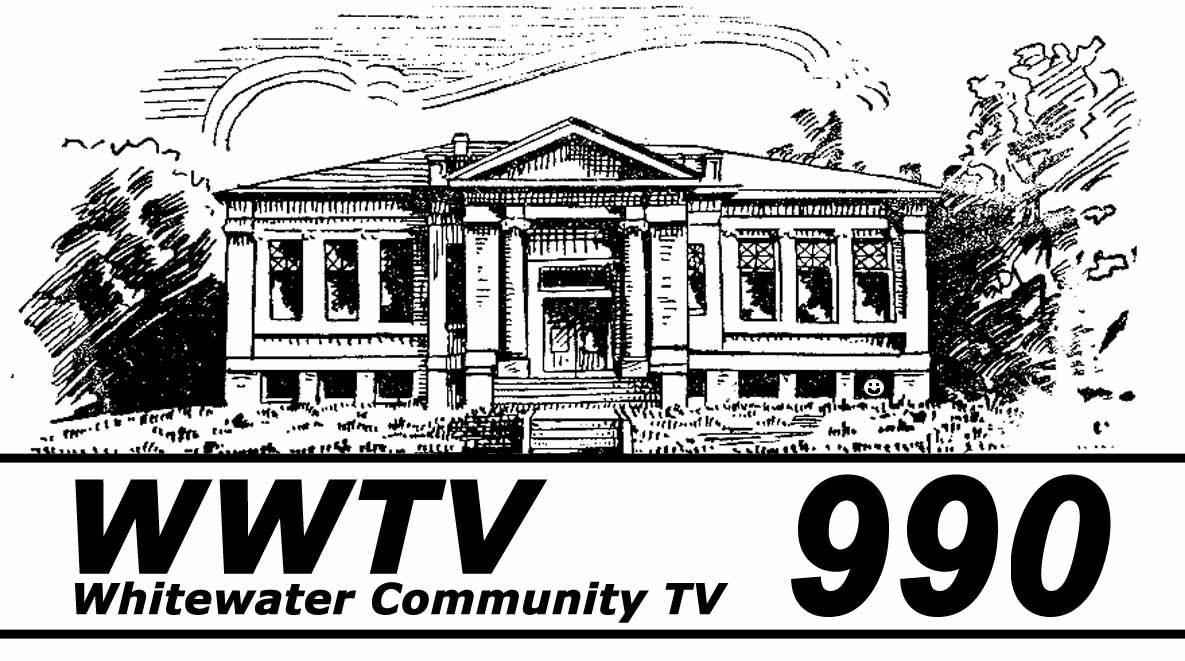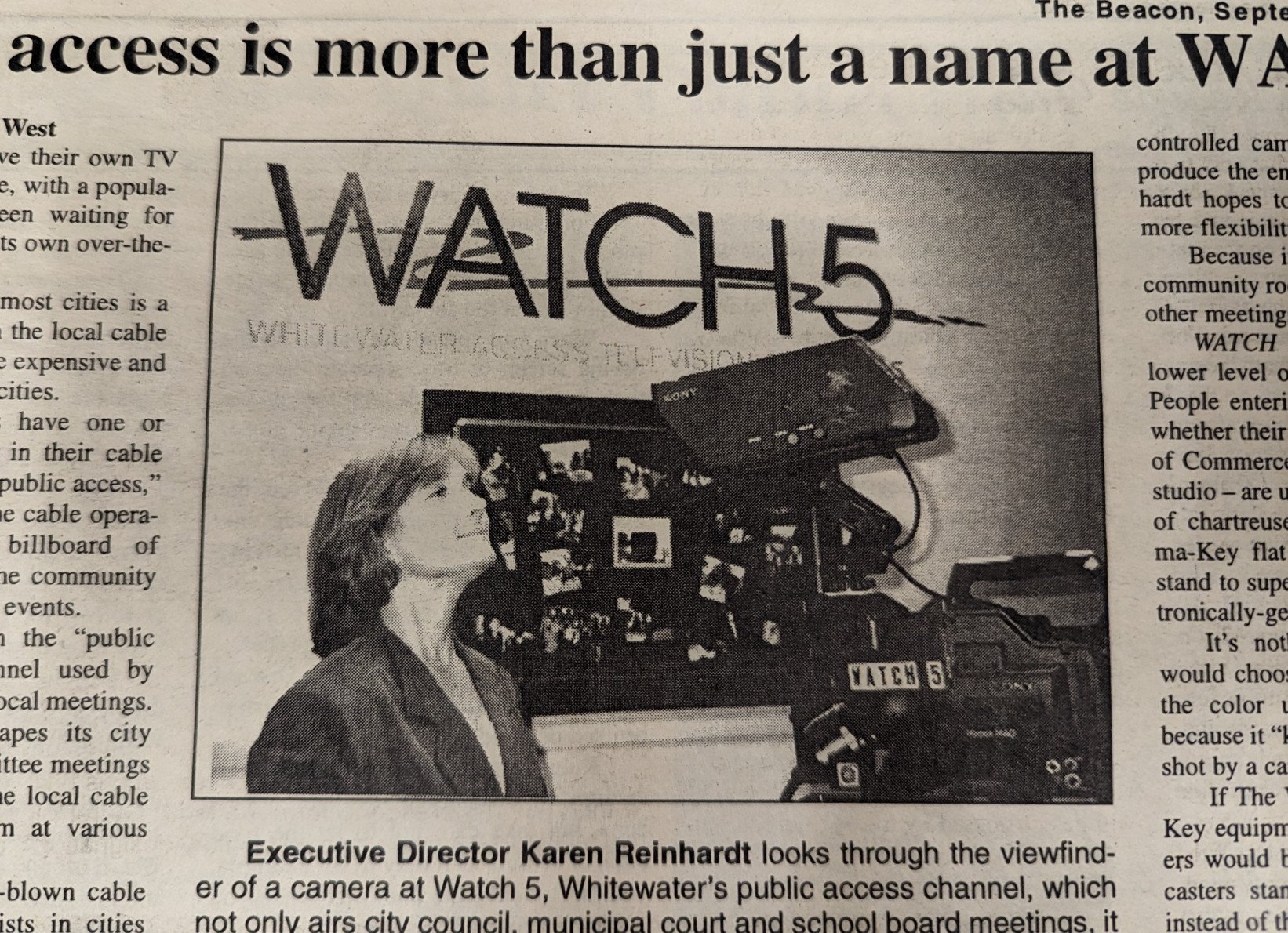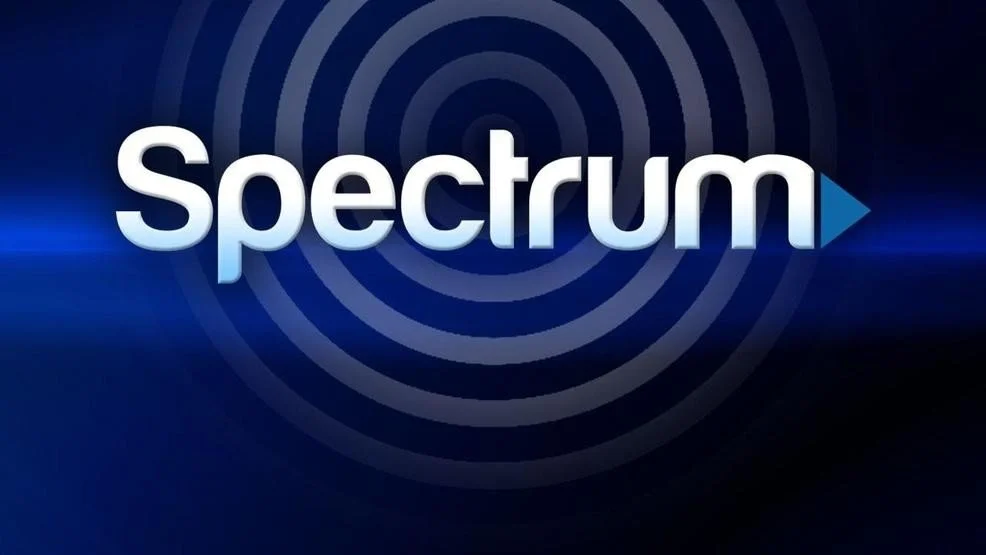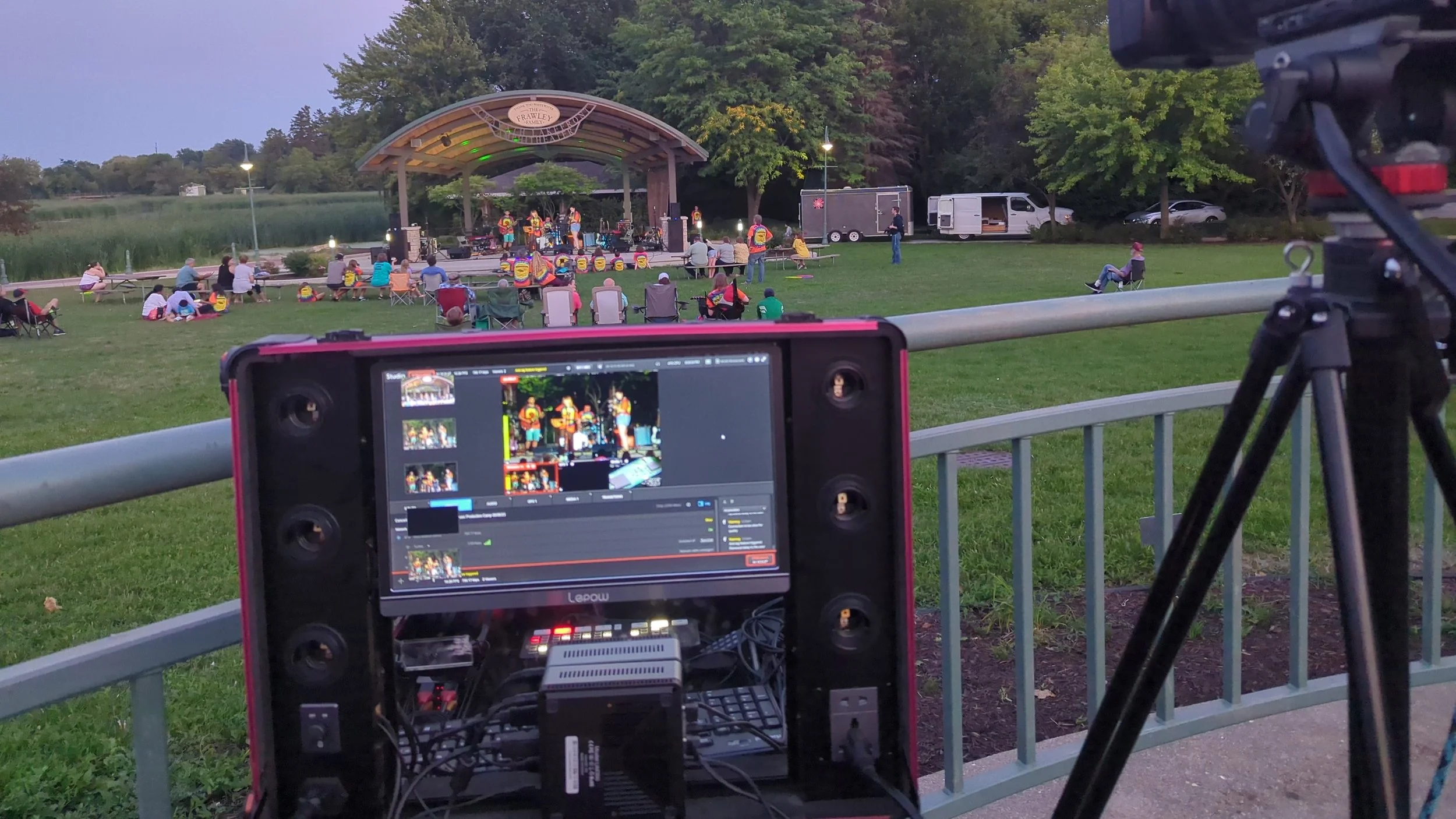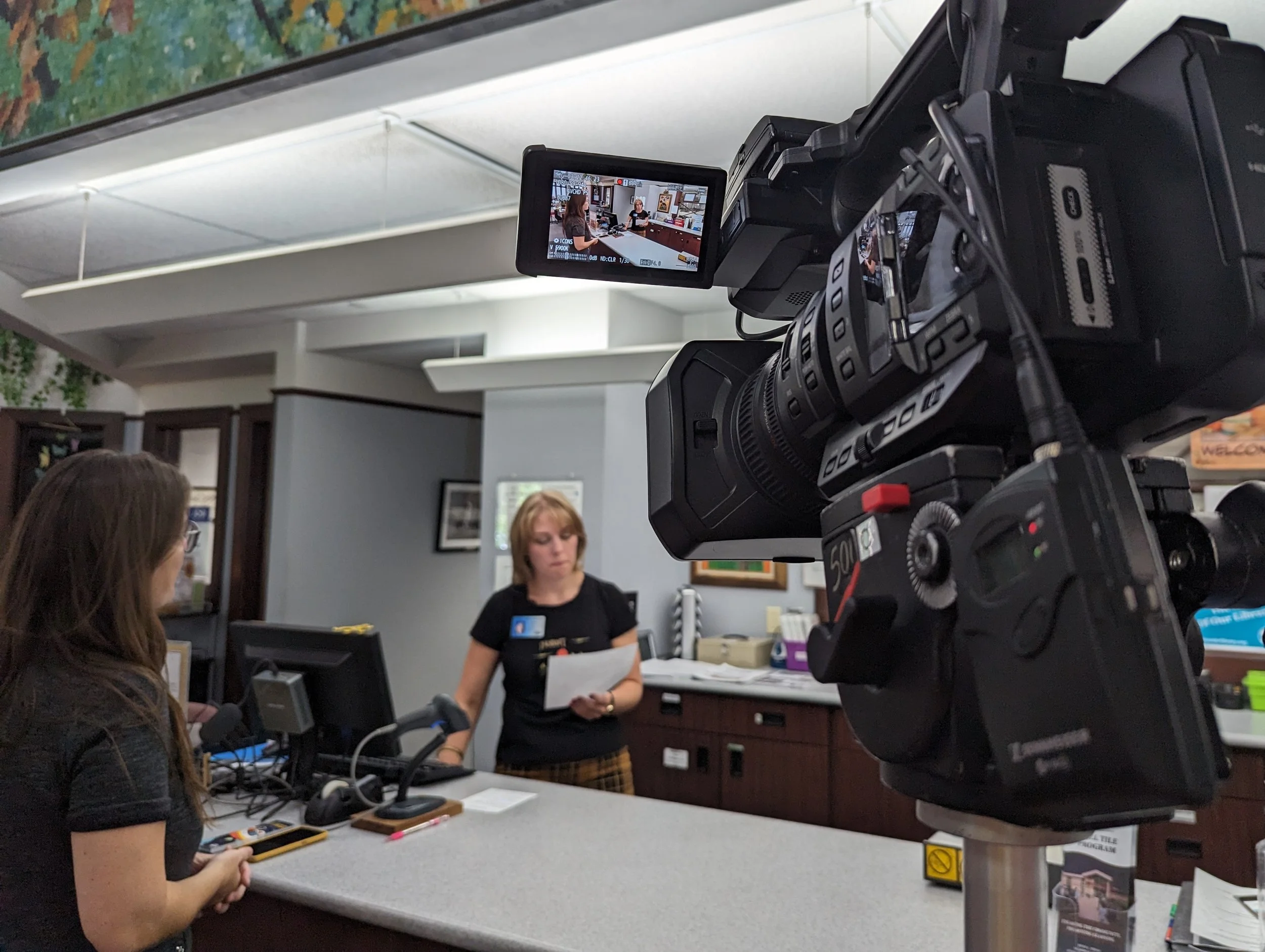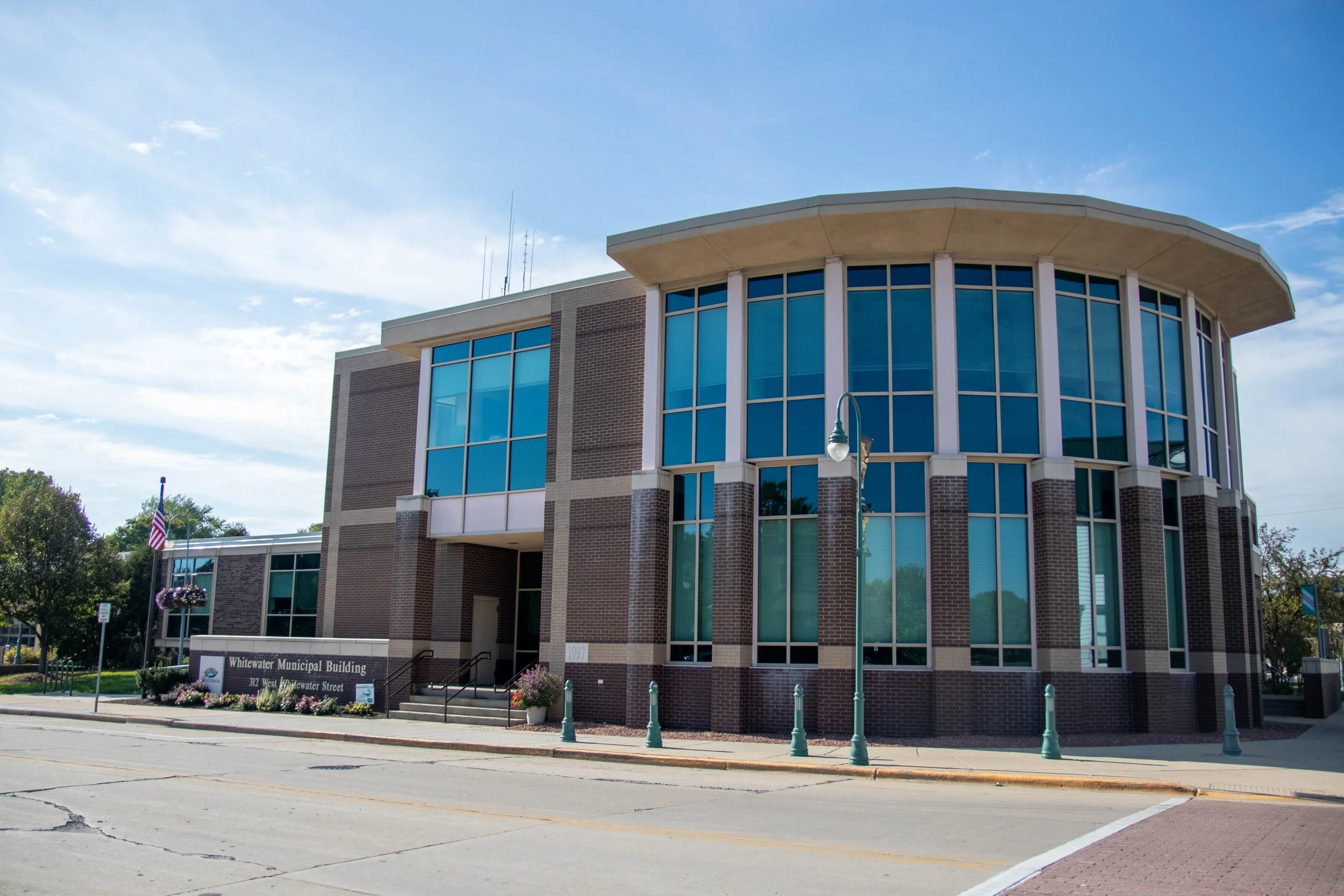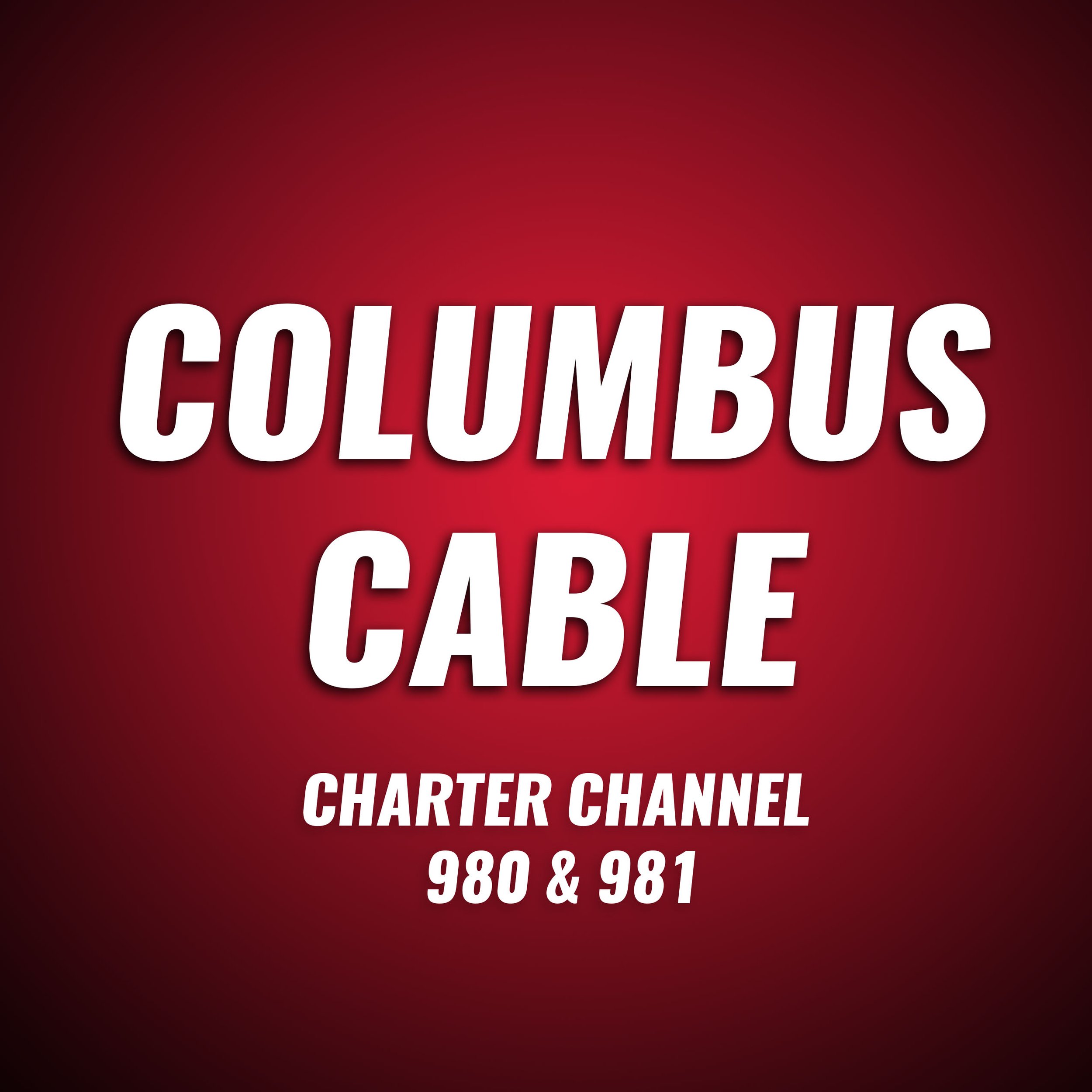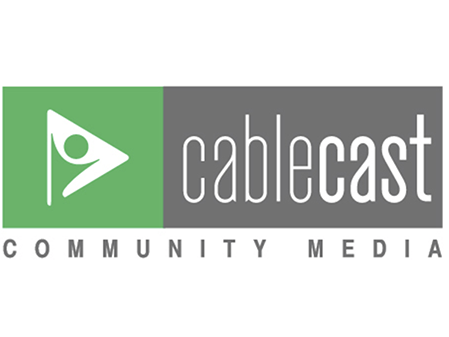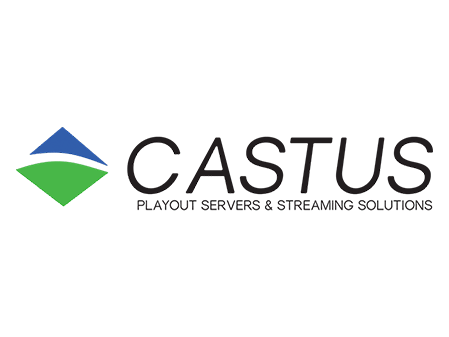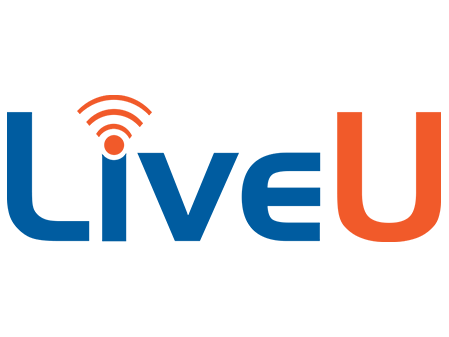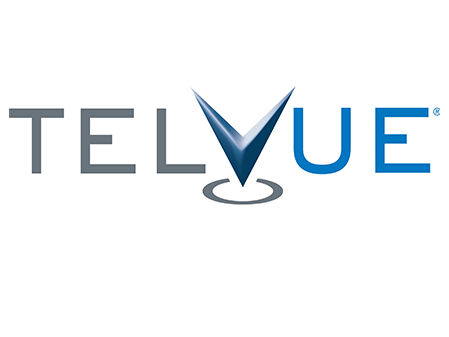Whitewater Community Television is pleased to announce that Channel 990 is back on the air on Charter Spectrum’s cable TV system. The PEG (public, education, and government) access channel had been experiencing difficulties of one sort or another since late 2019. For Zachary Popke, a long-time employee who was officially promoted to run the city’s Media Services department in June, it was a moment for rejoicing. “I treated myself to a nice dinner when I saw the channel finally come on air,” he said.
Zachary Popke, former Media Coordinator, City of Whitewater
Resiliency and determination are two words that come to mind after talking with Popke. And lest you think that making a cable television station work is just a matter of plugging in a couple of cables and “voila,” Zac’s story will knock that notion right out of your head!
It all began in late 2019, when the station’s old Leightronix broadcast server started acting a little funny. The picture looked rough and would cut in and out. Finally, in the middle of 2020, it quit altogether.
Whitewater Community TV is mostly funded by the video service provider (VSP) fee the City of Whitewater receives from Charter Spectrum for the use of city streets, plus some money from the city’s general fund. As a small town with a population just shy of 14,000, the fees do not amount to very much. In 2019 VSP fee payments totaled $90,000; it’s just enough to manage a small PEG access media center. The city is also home to the University of Wisconsin – Whitewater. The city’s population nearly doubles when the student body of almost 11,000 is taken into account. UW-Whitewater also has a cable television channel that is heavily used for sports coverage and award-winning student work. Popke is excited about a new collaboration with the university that will result in the city’s PEG channel carrying UWW-TV student-produced programming.
The new Watch 5 cable channel gets some press in 1993 featuring the first long-time Whitewater executive director, Karen Reinhardt. The channel was later brought under city management.
Whitewater Community TV began in 1993 as “Watch 5.” It was initially led by part-time coordinators, most notably Karen Reinhardt, who is credited with invigorating the station and moving it from the Old Armory to the White Building, and Alan Luckett, who succeeded Reinhardt in 2000. Luckett forged strong ties with the school district, specialized in coverage of concert performances, and continued working heavily with the non-profit community, as well as with the city. In 2006, the city made the position full-time by increasing the VSP fee the city was collecting from Charter Spectrum from 4% to 5%. Luckett managed the station for another nine years until 2016. During his tenure the channel moved to channel 13 and then to analog 98 and digital 990. Today the city’s channel is seen on Charter Spectrum cable channel 990 only, although TDS is planning to offer cable service in the city beginning in 2024 and will also carry Whitewater’s PEG access channel.
Alan Lucket presents an audio workshop at the 2023 WCM Annual Conference in Madison. Luckett is now director of Janesville JATV.
Historically, the station provided video production training to the public, but this mostly ended after Luckett’s tenure when the city redefined the media director position to manage not only the TV station, but also public relations, social media, and city website maintenance. Dedicated part-timers, including Popke, became responsible for day-to-day management of Whitewater Community TV.
When the broadcast server died in the summer of 2020, the budget for the media department was not able to accommodate an equipment purchase of $10,000 or more. Besides that, the city was halfway through its biannual budget year and it did not typically allocate new money to projects at this point in the calendar. On top of that, it was clear that not only the server, but also the outdated analog modulator that connected Whitewater Community TV to the cable company was far past its useful life and needed to be replaced. The city approached Charter Spectrum about upgrading this transmission equipment and the company quoted a price of $10,000 for a digital Drake encoder. Between the two items, the city was looking at a bill of well over $20,000. An impossibility.
Former City of Whitewater Communications Manager Kristin Mickelson
So, Whitewater Community TV was no longer on cable TV. To see city council meetings, viewers were directed to watch the livestream on Vimeo.com or go to the city’s CivicPlus website where Vimeo videos were embedded. The station continued to cover local events and post them on the city’s Vimeo page.
Then in 2021, federal ARPA funds were made available to help cities deal with pandemic-related expenses. The pandemic had made live video coverage of meetings essential and interactivity with the public a top priority. The city used part of its funds to upgrade its council chambers with a new sound system, three PTZ (Pan Tilt Zoom) remote cameras, and a Black Magic ATEM mini switcher that could output a signal in several ways, including one that would work for livestreaming through Vimeo. After searching the world over, IT Manager Tim Nobling found a broadcast server called DV Play made by a Bulgarian firm to interconnect with the Drake encoder Charter Spectrum had specified. The affordable cost of the service, however, proved to be its biggest drawback. “We may be the only American customer,” said Popke. “I can’t find anyone else who uses them.”
Kristin Mickelson was the PR and Communications Manager for the City of Whitewater at the time. She contacted Charter Spectrum in April 2021 to involve the company in the city’s upgrade plans to make sure they would be compatible with the cable system. No response was received. In June, Mickelson reached out to Charter Spectrum again, asking to be included in whatever upgrade process they had. This time the company told the city it would need to do a site survey and the city would need to fill out some forms. The city dutifully complied. By the end of June, the city’s upgrade was complete, the Drake encoder purchased from Charter Spectrum, but there was no response yet from the company, and no programming, live or otherwise, was going out over cable TV.
Months went by. In late November 2021 Charter Spectrum told the city the upgrade would be made “a priority.”
Then in January 2022, eight months after the city first contacted Charter Spectrum about collaborating on the upgrade, the company emailed a contract for the city to sign saying the work would be completed within six months.
At that point, City Manager Cameron Clapper and Mickelson wrote their Assembly representative to ask for help.
Whitewater’s PEG channel is an important line of communication for many residents. When live access to public meetings via the channel is unavailable, local government transparency is limited and it is much more difficult to keep residents up to date on local issues. Further, these limitations are negatively impacting the very cable subscribers paying fees to support the service.
It is incredibly disheartening to dedicate time and resources to improvements that better enable the City of Whitewater to provide greater public visibility and access to local government processes only to be neglected and ignored by a private company seemingly bent on avoiding its corporate social responsibility.
The City of Whitewater is asking for your assistance in reaching out to Spectrum and compelling them to swiftly complete the needed upgrades in Whitewater. Until Spectrum is held accountable for its lack of response in these matters, cable subscribing residents will suffer a lack of timely access to valuable information pertaining to their local governments and overall communities.
Throughout 2022 there was no further action. City Manager Clapper left and his successor, John Weidl, took over in October. By the end of 2022 both Nobling and Mickelson, who had been on leave for part of the year, left the employ of the city as well. Popke became the de facto station manager in January 2023 and was officially promoted to Media Coordinator in June. He had been hired in 2014 when he was a senior in high school by Luckett. “Alan taught me everything about video,” said Popke. “He took a chance on me.”
Whitewater City Manager John Weidl
At the start of the new year, with new IT Manager Tim Neubeck in place, Weidl decided to prioritize getting the channel up and running. He reached out to Charter Spectrum and the company assigned a project manager, who told the city the Drake encoder would be installed that month. A “72-hour soak test,” a test that checks the signal strength, was scheduled to begin on January 19. But inquiries about the test results were met with silence, and later Popke learned that the test was delayed because the project manager was out sick. In mid-February, Charter Spectrum informed the city that more equipment would be needed to get a proper signal. The company instructed the city to buy a dedicated monitor to watch the outgoing cable signal and a Blackmagic Design monitor/graphics card to output the station’s broadcast signal in SDI to the Drake encoder. Neubeck purchased the items, and another soak test was scheduled for early March. Throughout the month work continued on the signal.
By April, the channel still wasn’t on the air, but a meeting on April 6th between technicians from the city (Neubeck, Popke, and Tim Turner from DigiCorp) and three engineers from Charter Spectrum resulted in a breakthrough. The group made changes to the software and the hardware used by both the city and the company that finally corrected a framerate issue with the video.
But if you thought that would be the end of the saga, you would be mistaken. At the end of April, Charter Spectrum told the city that the next phase of the process would begin!
A new group of Charter Spectrum engineers now took over. They told the city that channel 990 would be back on the line up in three months on August 1st. If you’re counting, that’s two years and three months after the initial request in April, 2021.
But August 1st became August 3rd. The signal was being received, but it was not going out over the subscriber network. On August 4th, Charter Spectrum told the city a new team had been assigned to the case. They discovered that the previous team had not placed a new piece of equipment into service that would relay the signal to the subscriber system.
Finally, really and truly, on August 9, 2023 at 7:30 am Whitewater Community TV burst onto the cable system on channel 990.
Popke talked about the stress he was under during 2023 as the person responsible for getting the station up and running for the city, but he knew he had to keep going. “After the station finally went on the air, I suddenly became conscious of all the stress I was carrying in my body, and I had to take some time off. My worry the whole time was that it was somehow my fault that the connection wasn’t working. I talked with Tim Neubeck and Tim Turner and they told me there was nothing more I could do. The city manager is a very no-nonsense person and he wanted to know why it wasn’t working. Both Tim, our IT manager, and my supervisor, Chief of Staff Taylor Zeinert, told him there was nothing more the city could do but wait. When we found out it was an error on Charter Spectrum’s end, I felt vindicated, and so relieved.”
City of Whitewater Interim Media Coordinator Matt Gibes
Popke stepped down last week as the coordinator of Whitewater Community Television to search for a position that pays more for its responsibilities. Matthew Gibes, currently a part-time Media Producer at Whitewater Community TV, will be filling in full-time as the interim Media Coordinator. The city has posted the position. Popke is confident that the center is in good hands. “I feel Whitewater Community Television is going to be well run with Matt as the interim coordinator, and I wish my successor, whoever that may be, the best of luck.”
“I am a big believer in public media,” said Popke. “It’s important to have hyperlocal coverage. It’s not physically possible to attend everything that happens in a community. The only way to keep up is through public media like Whitewater Community Television. We are compensated to be at events and meetings, and we do a good job covering them.”
Popke recommends checking out a community’s local public access TV channel before moving in. “You can find out so much about a community by watching the local PEG station. You can find out why it is worthwhile to live in that community. You can see their events, look up old meetings, see what’s happening at the schools, learn some history. I think a PEG channel demonstrates that a city is alive.”
Popke is not planning to go far. “I will continue to work with Whitewater Community Television as a private resident. It’s community TV. I plan to use the resources, use the expertise, and borrow the equipment. I think the best way to encourage people to use a PEG access center is to do it yourself. I have a couple of program ideas that I didn’t have the time to do while I was working, but now I will!”

